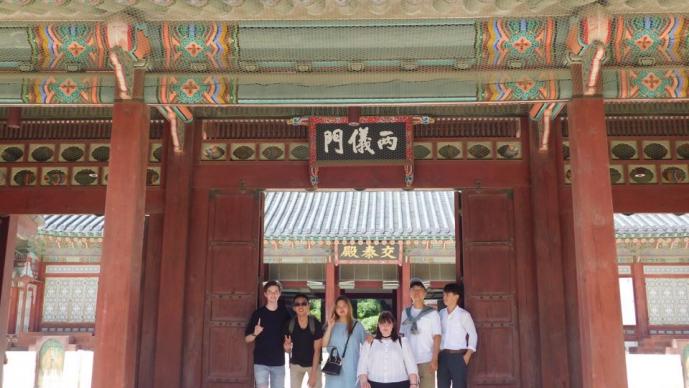Yonsei University in South Korea (USAC)
The Program
Yonsei University is one of the Top 150 World Universities as ranked by the Times Higher Education. Students can also enjoy its beautiful and tranquil campus located in the heart of the city
The Seoul program offers courses that introduce you to the business, politics, economics, philosophy, religion, and language of Korea, one of the most rapidly developing nations in East Asia. Seoul is a city of opposites bustling with palaces, city gates, and temples next to government offices, embassies, theatres, shopping, and more. Seoul is also home to many IT corporations and is emerging as one of the most “wired” cities in the world, allowing you to experience the opportunities offered by the communications revolution.

Program Location

South Korea
Seoul
Seoul is located in the northwest corner of South Korea, and the Han River winds through the city, splitting it in two. It is an intriguing city, transforming itself from the Yi Dynasty capital of the Hermit Kingdom, to a major mover and shaker on the international scene, especially in the fields of commerce and sports. Despite the modern high-rises and freeways, the cityscape retains pockets of centuries-old temples, palaces, pagodas, and gardens.
Academics
Yonsei University has held the position as top private university in Korea in the QS World University Rankings for many consecutive years. Students can choose from a wide range of undergraduate courses taught in English. You can find more information on the offered courses here.
You will need to be sure that you are registered as a full time student according to Yonsei University and Rutgers University. That means you will need to take approximately 12-15 credits while abroad. The credit translation system between Yonsei University and Rutgers University is 1:1, meaning a 3-credit course at Yonsei University will also be a 3-credit course on your Rutgers University transcript. It is not possible to take classes as not-for-credit or pass/fail.
For information about Study Abroad credit transfer, registration, and transcripts please visit the Academics section of our website.
Housing and Meals
Residence Hall- SK Global House (limited availability)
Housing is not included in your USAC/Rutgers program fees. It is each student’s responsibility to reserve and pay for housing. Housing fees will be paid directly to the housing provider of your choice abroad.
Located on campus, the SK Global House accommodate up to 845 international students. Nearby classrooms and easy access to shops, restaurants and public transportation create an ideal environment for both the academic and cultural experience. There are two lounges on each floor with a computer room, laundry room, and a lecture hall. Rooms are single or double occupancy and are reserved directly with Yonsei University on a first-come, first-served basis upon acceptance. The residence halls are extremely competitive and fill quickly. While there is no established meal plan, there are on-campus cafeterias, restaurants, shared refrigerators in the dormitory, and nearby bakeries and food stores offer a wide selection of choices.
If you are not able to secure space in one of the residence halls or are interested in alternative housing options, studios and multi-bedroom apartments can be found within a 10- to 20-minute walk from campus. You are responsible for making these arrangements on your own.
For pictures of the dorm click here. For more information about housing, click here. On Page 4 of the Housing Guide, students will find detailed instructions on how to go about applying and then paying for their housing if they’d like to do it through Yonsei, i.e., SK Global. It includes the timing of when the housing application opens as well as a link that students should use to apply. It’s important to note that housing can fill up very quickly, so students are highly encouraged to apply immediately as it becomes available. Should students not receive housing on-campus, the Housing Guide does provide resources for other options available to them.
Financial Information
Program Costs
| NJ Resident | non-NJ Resident | |
|---|---|---|
| ATW Program cost* | $13,000 | $16,900 |
Program Cost includes:
• Tuition
• Administrative Fees
• Emergency Medical Access Abroad
• *Access the World (ATW)
Out-of-Pocket Costs
| Airfare | $1,500 |
| Housing | $1,300 |
| Meals | $1,800 |
| Alien Registration | $125 |
| USAC Application Fee (waived) | $0 |
| Books and Classroom Materials | $315 |
| Local transportation | $300 |
| Student Fee/Insurance | $300 |
| Personal Expenses | $1,000 |
| Total | $6,640.00 |
Out-of-Pocket Cost includes:
The above costs are estimations and represent the known out-of-pocket costs students encounter during their time abroad.
Some of these expenses will be paid for prior to going abroad, such as an airline ticket and visa costs, while some of these expenses, such as meals and local transportation, will be paid in-country as part of your daily expenses. As you plan, you will need to budget these costs and spend wisely throughout your time abroad.
*The $100 non-refundable USAC application fee you paid USAC has already been deducted from the program cost.
Program Costs
| NJ Resident | non-NJ Resident | |
|---|---|---|
| ATW Program cost* | $13,000 | $16,900 |
Program Cost includes:
• Tuition
• Administrative Fees
• Emergency Medical Access Abroad
• *Access the World (ATW)
Out-of-Pocket Costs
| Airfare | $1,500 |
| Housing | $1,300 |
| Meals | $1,800 |
| Alien Registration | $125 |
| USAC Application Fee (waived) | $0 |
| Books and Classroom Materials | $315 |
| Local transportation | $300 |
| Student Fee/Insurance | $300 |
| Personal Expenses | $1,000 |
| Total | $6,640.00 |
Out-of-Pocket Cost includes:
The above costs are estimations and represent the known out-of-pocket costs students encounter during their time abroad.
Some of these expenses will be paid for prior to going abroad, such as an airline ticket, while some of these expenses, such as meals and personal expenses, will be paid in-country as part of your daily expenses. As you plan, you will need to budget these costs and spend wisely throughout your time abroad.
